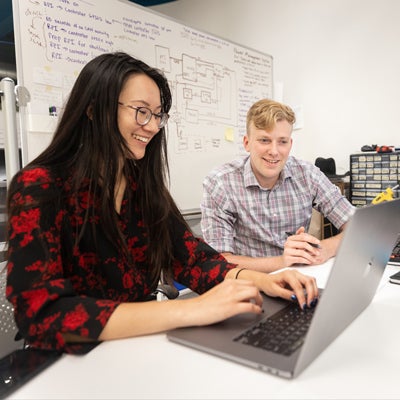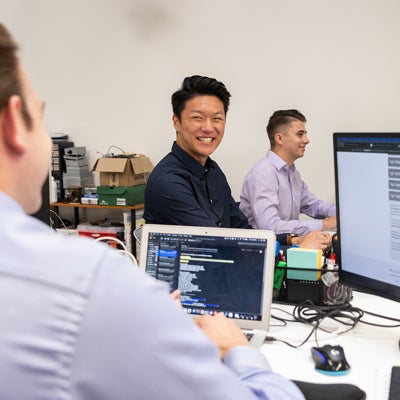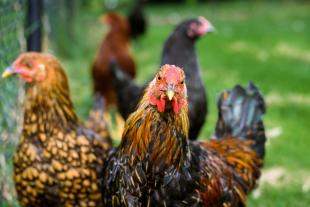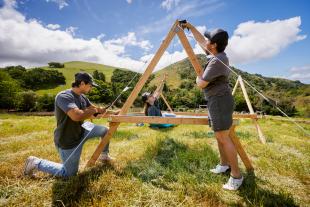Could These Students Improve the Global Food Supply? They’re Finding Out — One Tractor at a Time

The TractorCloud team works in the HotHouse. Left to right: Harrison Whitaker, Roxanne Miller, Morgan Swanson, Jin Huang and Kyle Kesler. Not pictured: Takumi Arai.
While many Mustangs are enjoying a leisurely summer break, a team of six engineering, computer science and industrial technology students are getting their hands dirty on local farms and ranches — in hopes of making a global impact.
The team is behind the startup TractorCloud, which is developing hardware and software to help heavy machinery operators and agricultural managers diagnose equipment problems and predict maintenance needs. They believe their technology can ultimately help grow food more efficiently and strengthen the global food supply.
The team is one of nine startups putting their ideas to the test in the Center for Innovation and Entrepreneurship’s (CIE) Summer Accelerator, a 13-week program that helps students and recent graduates develop their ideas and launch their companies.

“All of these pieces of equipment that are out there in the field, they all have to be individually managed by someone, and that leads to a lack of efficiency,” says Morgan Swanson, a student earning his master’s degree in computer science who had the idea to research data from operating systems on tractors. “It feels like it’s a new technological frontier where there’s a lot of space for improvement.”
The team is developing a hardware component that rides onboard with tractors and other heavy equipment to stream data to the cloud. The information translates to live dashboards and mobile interfaces that help managers and operators understand their equipment’s performance and make better calls in real time, like assessing what vehicles are the highest priority for maintenance.
To vet the TractorCloud vision in real-world settings, the entrepreneurs reached out to the local agricultural community, including Cal Poly’s Agricultural Operations team. They met Louis Bayer, who has helped the university manage its fleet of more than 100 tractors and other vehicles.
“I know a lot of them do not have an agricultural background, so it's nice to be able to give them the perspective of someone who's been doing this for 23 years, working on tractors and dealing with farmers,” said Bayer. “There's been plenty of Zoom meetings, but we've also gone and done a lot of trial and error on a few tractors on campus — ones that have constant error codes.”
Bayer juggles what can be costly maintenance for multiple types of machinery, some of which are 40 to 50 years old. Newer models have data ports that allow the TractorCloud team to test their hardware. Bayer has worked with engineering students trying to find solutions to agricultural maintenance challenges before, but he thinks this team is making some important progress.
“It's great to see that they're actively trying to help the farmer and the end user acquire and use the data,” he said.
Customer development is one of several priorities TractorCloud has this summer. The team is also leveraging the Accelerator’s mentors, networking, educational workshops and $10,000 in seed funding to its fullest potential. Thanks to an ebb of COVID-19 cases locally, eight of the nine teams, including this one, are working in the CIE’s 10,000-square-foot HotHouse in Downtown San Luis Obispo.
“Before, we were just working out of a house kind of siloed away, and now we’re exposed to all these ideas flying around at once with different strategies,” said Harrison Whitaker, who is majoring in industrial technology and packaging. “We would never get this amount of opportunity, mentorship or industry connections anywhere else.”
Each week, they meet with different advisors in the entrepreneurial space, connect with alumni and learn from their fellow startups working in everything from fitness to education, renewable energy to footwear.

“One of the things we’ve really gotten out of the CIE is the pace that we’re able to move at when we’re focusing on this 24-7,” said Roxanne Miller, computer science student. “We’re really learning how to fail fast, come up with new ideas and really push ourselves. That’s been critical in finding out what our hidden strengths are and develop those as a team.”
Miller admits she never saw herself joining a startup. She was actually an animal science student on the pre-veterinary track before switching majors and eventually meeting Swanson in a computer science class.
“I find passions in a lot of places,” she said, “and when I saw this startup, I just thought it would be so exciting.”
The program has fueled many a-ha moments, says Swanson. One of them: long hours aren’t always the key to success.
“I think what makes you successful as a small team is not how much work you do,” he acknowledged. “I think it’s determining the most important thing — or most impactful thing — you could be doing with yourself. That’s way more important than the hours.”
The Accelerator culminates with Demo Day in September, when each team makes a pitch to community members and investors to showcase their growth. By then, TractorCloud wants to have hardware on tractors, adding value to their partners in the field.
But that’s not the end of the road. The CIE says that its Accelerator teams have a 22% survival rate — twice the industry average for early-stage startups.
“There’s so much company growth that we want to have,” said Miller. “When we started doing this, we made this entire wall in one of our houses covered with ideas for the future, the partnerships, all the lives we can add value to. Demo Day is a great launching pad for us onto those bigger ideas.”
“We want to encourage anyone else who’s thinking about improving the food supply: there’s space for you!” added Swanson. “There’s so much that can be done.”
To see TractorCloud and the entire cohort of Accelerator teams present at Demo Day on September 14 at SLO Brew Rock, visit the CIE website.




